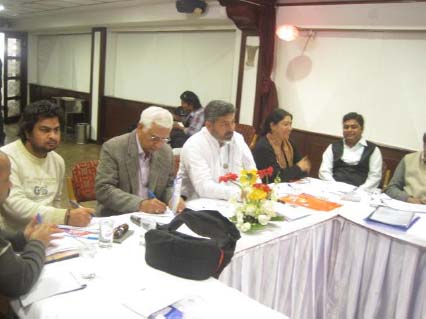Sustainability
Draft National Water Policy 2012 - Dialogue organised by NEER Foundation, Meerut on February 18, 2012
Posted on 27 Feb, 2012 10:07 AMGuest post by: Raman Kant Tyagi

Mayadantha Male (The miracle of rain) - All India Radio Karnataka programme on rainwater harvesting
Posted on 26 Feb, 2012 04:37 PM"The miracle of rain : Let the earth overflow"
Water resource accounting as a tool for urban water management - An illustration in NCT- Delhi - Journal of Indian Water Works Association
Posted on 24 Feb, 2012 10:41 PMThe paper discusses the natural resources accounting in the context of national/regional policy first, and then places water resource accounting within it. Subsequently, the methodology as well as study framework adopted for resource accounting are discussed.
Inducing vulnerabilities in a fragile landscape: The implications of hydropower development in a seismically active zone - An article in EPW
Posted on 24 Feb, 2012 08:25 PMClose to 30 hydroelectric projects are being planned on the Teesta and its tributaries. Not only is this river an essential part of Lepcha identity and life, but it also flows through a fragile zone. In this article first published in the Economic and Political Weekly (EPW), Kanchi Kohli examines the ramifications of this policy.
Construction empties Kashmir's rice bowl: How unplanned 'development' has led to a shortage of this staple crop
Posted on 24 Feb, 2012 03:16 PMVideo courtesy: VideoVolunteers
Once upon a lake: A report on the current status of the lakes of Mahadevpura constituency, Bengaluru with recommendations for restoration
Posted on 23 Feb, 2012 05:55 PMMap of the lakes in Bengaluru, source: ATREE
"In search of old ideas" - A discussion of the draft national water policy 2012, by Jayanta Bandopadhyay in The Telegraph
Posted on 22 Feb, 2012 05:05 PMAuthor: Jayanta Bandopadhyay
Article and image courtesy: The Telegraph
New water policy more contentious; least helpful in tackling existing issues
Posted on 22 Feb, 2012 12:34 PMAuthor : Dr. Arvind Kumar
How valuable are environmental health interventions? - Evaluation of water and sanitation programmes in India - Paper published in the Bulletin of the World Health Organisation
Posted on 21 Feb, 2012 06:11 PMThe paper informs that a number of epidemiological studies on the benefits of water and sanitation interventions have shown that diarrhoea can be reduced by 30–50%.






